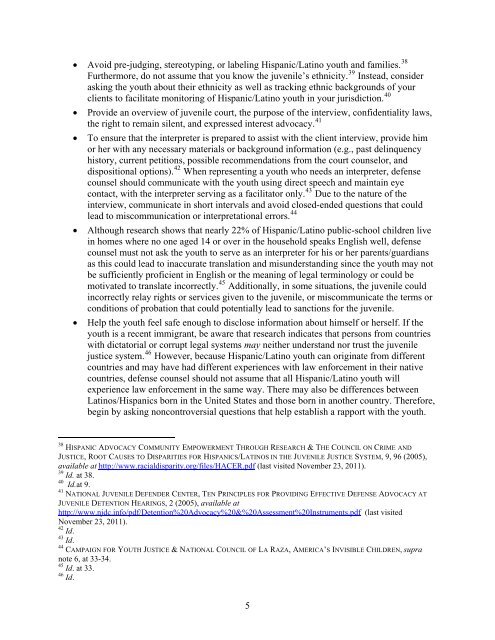Latino and Hispanic Youth in the Juvenile Justice System
Latino and Hispanic Youth in the Juvenile Justice System
Latino and Hispanic Youth in the Juvenile Justice System
You also want an ePaper? Increase the reach of your titles
YUMPU automatically turns print PDFs into web optimized ePapers that Google loves.
• Avoid pre-judg<strong>in</strong>g, stereotyp<strong>in</strong>g, or label<strong>in</strong>g <strong>Hispanic</strong>/<strong>Lat<strong>in</strong>o</strong> youth <strong>and</strong> families. 38<br />
Fur<strong>the</strong>rmore, do not assume that you know <strong>the</strong> juvenile’s ethnicity. 39 Instead, consider<br />
ask<strong>in</strong>g <strong>the</strong> youth about <strong>the</strong>ir ethnicity as well as track<strong>in</strong>g ethnic backgrounds of your<br />
clients to facilitate monitor<strong>in</strong>g of <strong>Hispanic</strong>/<strong>Lat<strong>in</strong>o</strong> youth <strong>in</strong> your jurisdiction. 40<br />
• Provide an overview of juvenile court, <strong>the</strong> purpose of <strong>the</strong> <strong>in</strong>terview, confidentiality laws,<br />
<strong>the</strong> right to rema<strong>in</strong> silent, <strong>and</strong> expressed <strong>in</strong>terest advocacy. 41<br />
• To ensure that <strong>the</strong> <strong>in</strong>terpreter is prepared to assist with <strong>the</strong> client <strong>in</strong>terview, provide him<br />
or her with any necessary materials or background <strong>in</strong>formation (e.g., past del<strong>in</strong>quency<br />
history, current petitions, possible recommendations from <strong>the</strong> court counselor, <strong>and</strong><br />
dispositional options). 42 When represent<strong>in</strong>g a youth who needs an <strong>in</strong>terpreter, defense<br />
counsel should communicate with <strong>the</strong> youth us<strong>in</strong>g direct speech <strong>and</strong> ma<strong>in</strong>ta<strong>in</strong> eye<br />
contact, with <strong>the</strong> <strong>in</strong>terpreter serv<strong>in</strong>g as a facilitator only. 43 Due to <strong>the</strong> nature of <strong>the</strong><br />
<strong>in</strong>terview, communicate <strong>in</strong> short <strong>in</strong>tervals <strong>and</strong> avoid closed-ended questions that could<br />
lead to miscommunication or <strong>in</strong>terpretational errors. 44<br />
• Although research shows that nearly 22% of <strong>Hispanic</strong>/<strong>Lat<strong>in</strong>o</strong> public-school children live<br />
<strong>in</strong> homes where no one aged 14 or over <strong>in</strong> <strong>the</strong> household speaks English well, defense<br />
counsel must not ask <strong>the</strong> youth to serve as an <strong>in</strong>terpreter for his or her parents/guardians<br />
as this could lead to <strong>in</strong>accurate translation <strong>and</strong> misunderst<strong>and</strong><strong>in</strong>g s<strong>in</strong>ce <strong>the</strong> youth may not<br />
be sufficiently proficient <strong>in</strong> English or <strong>the</strong> mean<strong>in</strong>g of legal term<strong>in</strong>ology or could be<br />
motivated to translate <strong>in</strong>correctly. 45 Additionally, <strong>in</strong> some situations, <strong>the</strong> juvenile could<br />
<strong>in</strong>correctly relay rights or services given to <strong>the</strong> juvenile, or miscommunicate <strong>the</strong> terms or<br />
conditions of probation that could potentially lead to sanctions for <strong>the</strong> juvenile.<br />
• Help <strong>the</strong> youth feel safe enough to disclose <strong>in</strong>formation about himself or herself. If <strong>the</strong><br />
youth is a recent immigrant, be aware that research <strong>in</strong>dicates that persons from countries<br />
with dictatorial or corrupt legal systems may nei<strong>the</strong>r underst<strong>and</strong> nor trust <strong>the</strong> juvenile<br />
justice system. 46 However, because <strong>Hispanic</strong>/<strong>Lat<strong>in</strong>o</strong> youth can orig<strong>in</strong>ate from different<br />
countries <strong>and</strong> may have had different experiences with law enforcement <strong>in</strong> <strong>the</strong>ir native<br />
countries, defense counsel should not assume that all <strong>Hispanic</strong>/<strong>Lat<strong>in</strong>o</strong> youth will<br />
experience law enforcement <strong>in</strong> <strong>the</strong> same way. There may also be differences between<br />
<strong>Lat<strong>in</strong>o</strong>s/<strong>Hispanic</strong>s born <strong>in</strong> <strong>the</strong> United States <strong>and</strong> those born <strong>in</strong> ano<strong>the</strong>r country. Therefore,<br />
beg<strong>in</strong> by ask<strong>in</strong>g noncontroversial questions that help establish a rapport with <strong>the</strong> youth.<br />
38 HISPANIC ADVOCACY COMMUNITY EMPOWERMENT THROUGH RESEARCH & THE COUNCIL ON CRIME AND<br />
JUSTICE, ROOT CAUSES TO DISPARITIES FOR HISPANICS/LATINOS IN THE JUVENILE JUSTICE SYSTEM, 9, 96 (2005),<br />
available at http://www.racialdisparity.org/files/HACER.pdf (last visited November 23, 2011).<br />
39 Id. at 38.<br />
40 Id.at 9.<br />
41 NATIONAL JUVENILE DEFENDER CENTER, TEN PRINCIPLES FOR PROVIDING EFFECTIVE DEFENSE ADVOCACY AT<br />
JUVENILE DETENTION HEARINGS, 2 (2005), available at<br />
http://www.njdc.<strong>in</strong>fo/pdf/Detention%20Advocacy%20&%20Assessment%20Instruments.pdf (last visited<br />
November 23, 2011).<br />
42 Id.<br />
43 Id.<br />
44 CAMPAIGN FOR YOUTH JUSTICE & NATIONAL COUNCIL OF LA RAZA, AMERICA’S INVISIBLE CHILDREN, supra<br />
note 6, at 33-34.<br />
45 Id. at 33.<br />
46 Id.<br />
5

















